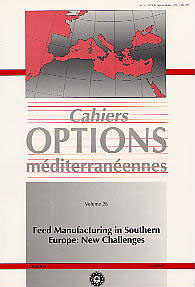| Article précédent | p. 107-114 | Article suivant |
The extrusion-cooking process in animal feeding. Nutritional implications
Extrusion-cooking can be described as a process whereby moistened starchy and/or proteinaceous materials are cooked and worked into a viscous, plastic-like dough. This physical treatment combines the heating of food products with the act of extrusion, which could be defined, in a simple way, as the shaping of a material by forcing it through a specially designed opening. In the present work the effect of the extrusion-cooking on the nutritional value of several cereals and full-fat soybeans, used in weaning piglet diets has been discussed. The inclusion of extruded cereals in the experimental diets, had a different effect depending on the ingredient evaluated. So, while the inclusion of extruded wheat or corn had no positive effect on the growth of the animals, the inclusion of extruded barley in the diets led to a better performance parameters during the first 20 days of the experiment. On the other hand, the use of extruded full-fat soybeans improved the performance parameters of the piglets.
- [ Afficher ]
- [ Télécharger ]
- [ Exporter la citation ]
Vous pouvez télécharger la citation au format :
- [ Imprimer ]
-
Mots-clés
ALIMENT POUR ANIMAUX, EXTRUSION, INGREDIENT, PERFORMANCE, SUBSTANCE NUTRITIVE, TRAITEMENT D'ALIMENTS POUR ANIMAUXCiter cet article
Serrano X. The extrusion-cooking process in animal feeding. Nutritional implications. In : Morand-Fehr P. (ed.). Feed manufacturing in Southern Europe: New challenges. Zaragoza : CIHEAM, 1997. p. 107-114. (Cahiers Options Méditerranéennes; n. 26). South European Feed Manufacturers Conference, 1996/05/09-11, Reus (Spain). http://om.ciheam.org/om/pdf/c26/97605976.pdf



